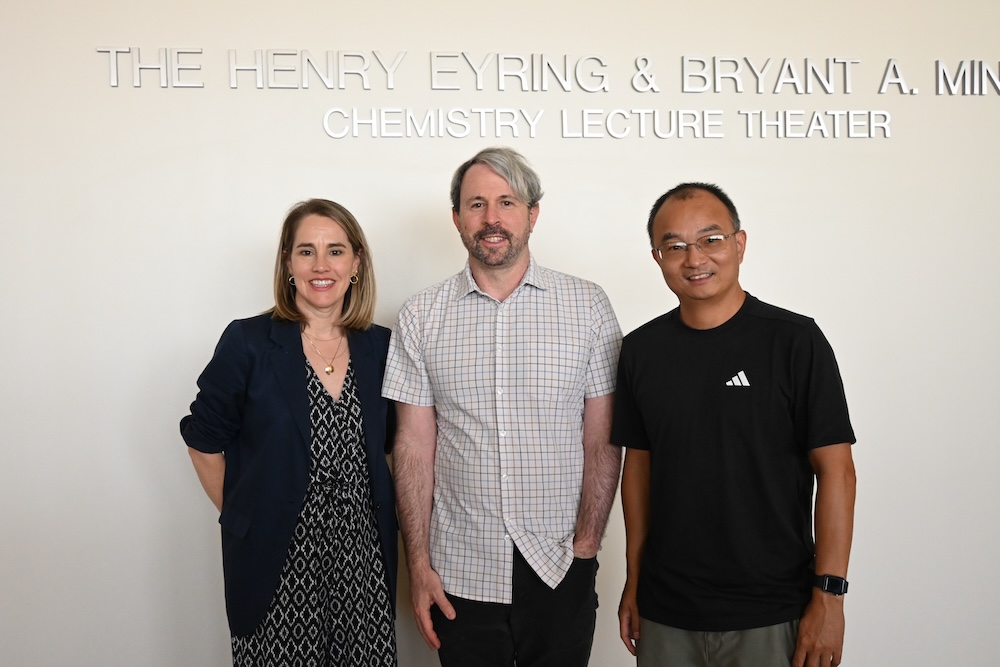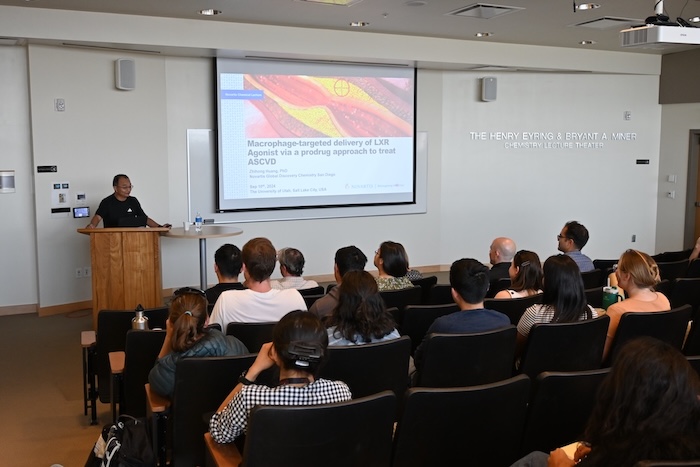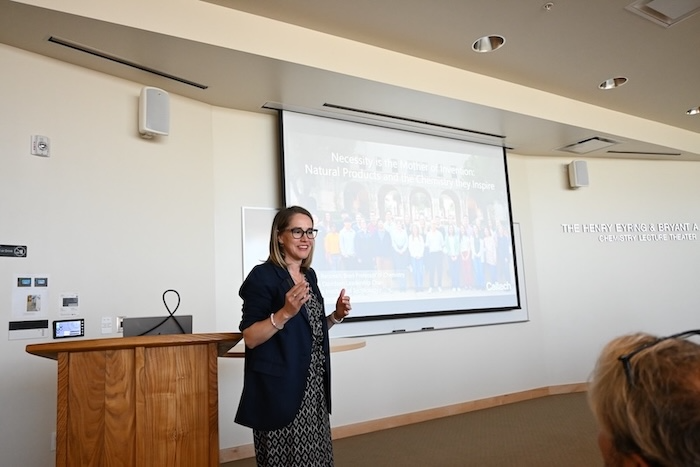On September 10, 2024, the University of Utah Department of Chemistry hosted the 2024 Novartis Seminar speakers Sarah Reisman, Bren Professor of Chemistry, Norman Davidson Leadership Chair, Division of Chemistry and Chemical Engineeringfrom Caltech, and Zhihong Huang, Associate Director at Novartis.
Distinguished Professor Matthew Sigman welcomed and introduced the speakers.

Matthew Sigman welcoming Sarah Reisman and Zhihong Huang at U Chemistry
Sarah Reisman’s seminar title was Necessity is the Mother of Invention: Natural Products and the Chemistry They Inspire.
Abstract: The chemical synthesis of natural products provides an exciting platform from which to conduct fundamental research in chemistry and biology. Our group is currently pursuing the synthesis of several structurally complex natural products, with a particular focus on the development of new convergent fragment coupling and annulation strategies. The densely packed arrays of heteroatoms and stereogenic centers that constitute these polycyclic targets challenge the limits of current technology and inspire the development of new synthetic strategies and tactics. In concert with our total synthesis efforts, we have an active program on the development of new reductive coupling reactions, including Ni-catalyzed asymmetric reactions of C(sp3) electrophiles and Sm-catalyzed reductive lactonization. This seminar will describe the latest progress in our target-directed synthesis and reaction development efforts.
Zhihong Huang seminar title was Macrophage-targeted delivery of LXR agonist via a prodrug approach to treat ASCVD.
Abstract: Macrophages play a key role in atherosclerosis because they accumulate as foam cells in large arteries, which in turn causes plaque formation, chronic inflammation and ultimately plaque instability leading to clinical events. More than a decade of research has established the LXR pathway as a major determinant of atherosclerosis susceptibility. In fact, LXR agonists were shown to decrease inflammation and LDL uptake, and increase cholesterol efflux in a macrophage- and LXR-mediated manner, leading to plaque regression and stability in preclinical models. However, on-target LXR agonism in hepatocytes can cause increased hepatic lipogenesis, hyperlipidemia and ultimately hepatic steatosis. Delivery of LXR agonists specifically to macrophages and avoiding the liver may improve their therapeutic index and to this end, the team is aiming to deliver LXR agonist selectively in macrophages.
One strategy to achieve the targeted delivery involves the selective cleavage of inactive LXR prodrugs to release the active drugs in macrophages, but in the meanwhile, these prodrugs must remain stable in the non-targeted liver tissue. To address these daunting challenges, we have created an unbiased phenotypic cellular screening platform that employs prodrug probes to discover enzymatic substrates that are cleaved in a cell-selective manner. Here we describe the identification of de-novo enzyme/substrates responsible for myeloid cell-selective cleavage (avoid hepatocytes and liver-resident macrophages). Importantly we show that myeloid cell-selective cleavage translates from probe to therapeutic LXR agonist prodrug in vitro. While the selective prodrug cleavage in rat mechanistic model to release a potent LXR agonist in macrophages was suggested by the apparent improved therapeutic index as compared to the delivery of LXR agonist drug itself, the permeable nature of the released first generation of LXR agonist drug, unfortunately, shrinked the tissue PD separation (Macrophages Vs liver) over time, which was also later supported by the mathematic modeling. We also describes the identification of macrophage-selective cleavage of prodrugs from a second-generation impermeable LXR agonist in vitro.
Thank you, Novartis, for supporting the University of Utah Chemistry and our future scientists.
 |
 |
Photos: Sarah Reisman and Zhihong Huang, speaking at the University of Utah Chemsitry on Spetember 10, 2024.
